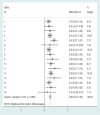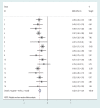The Road to Mental Readiness for First Responders: A Meta-Analysis of Program Outcomes
- PMID: 31010293
- PMCID: PMC6591743
- DOI: 10.1177/0706743719842562
The Road to Mental Readiness for First Responders: A Meta-Analysis of Program Outcomes
Abstract
Objectives: First-responder mental health, especially in Canada, has been a topic of increasing interest given the high incidence of poor mental health, mental illness, and suicide among this cohort. Although research generally suggests that resiliency and stigma reduction programs can directly and indirectly affect mental health, little research has examined this type of training in first responders. The current paper examines the efficacy of the Road to Mental Readiness for First Responders program (R2MR), a resiliency and anti-stigma program.
Methods: The program was tested using a pre-post design with a 3-month follow-up in 5 first-responder groups across 16 sites.
Results: A meta-analytic approach was used to estimate the overall effects of the program on resiliency and stigma reduction. Our results indicate that R2MR was effective at increasing participants' perceptions of resiliency and decreasing stigmatizing attitudes at the pre-post review, which was mostly maintained at the 3-month follow-up.
Conclusions: Both quantitative and qualitative data suggest that the program helped to shift workplace culture and increase support for others.
Objectifs:: La santé mentale des premiers intervenants, spécialement au Canada, est un sujet d’intérêt croissant étant donné le taux élevé de mauvaise santé mentale, de maladies mentales et de suicides. Bien que la recherche suggère généralement que la résilience et les programmes de réduction de la stigmatisation puissent influer directement et indirectement sur la santé mentale, la recherche a très peu étudié ce type de formation chez les premiers intervenants. Le présent article examine l’efficacité du programme En route vers la préparation mentale pour les premiers intervenants (RVPM), un programme de résilience et d’anti-stigmatisation.
Méthodes:: Le programme a été vérifié à l’aide d’un concept de suivi avant, après et à 3 mois auprès de 5 groupes de premiers répondants, dans 16 endroits.
Résultats:: Une approche méta-analytique a servi à estimer les effets généraux sur la résilience et la réduction de la stigmatisation. Les résultats indiquent que le programme RVPM a été efficace pour accroître les perceptions de la résilience chez les participants et pour réduire les attitudes stigmatisantes au suivi avant, après et à 3 mois, où elles se sont maintenues pour la plupart. Les données quantitatives et qualitatives suggèrent également que le programme a eu un effet sur le changement de culture en milieu de travail et sur le soutien accru des autres.
Conclusions:: La discussion porte sur une partie du contenu du programme et sur les facteurs de mise en œuvre qui ont pu mener aux résultats actuels.
Keywords: absenteeism; evaluation; meta-analysis; stigma.
Conflict of interest statement
Figures
References
-
- Kessler RC, Berglund PA, Demler O, Jin R, Merikangas KR, Walters EE. Lifetime prevalence and age-of-onset distributions of DSM-IV disorders in the national comorbidity survey replication. Arch Gen Psychiatry. 2005;62(6):593–602. doi:10.1001/archpsyc.62.6.593. - PubMed
-
- Smetanin P, Briante C, Stiff D, et al. The life and economic impact of major mental illnesses in Canada. RiskAnalytica, on behalf of the Mental Health Commission of Canada, 2011. Retrieved February 23, 2019 https://www.mentalhealthcommission.ca/sites/default/files/MHCC_Report_Ba....
-
- Johnson S, Cooper C, Cartwright S, et al. The experience of work-related stress across occupations. J Managerial Psychol. 2005;20(2):178−187.
Publication types
MeSH terms
LinkOut - more resources
Full Text Sources
Medical



